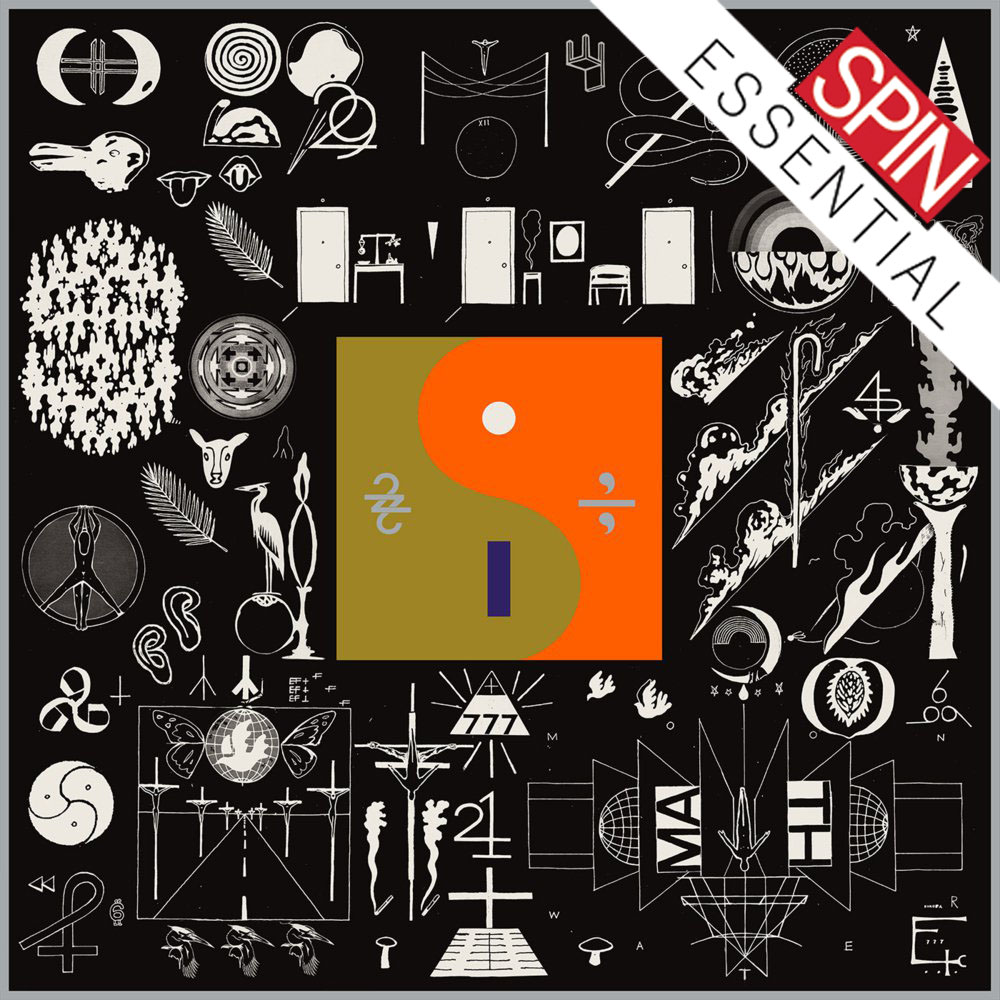Halfway through Obama’s first presidency, the mainstream tilted in such a way it seemed that indie music–that long-beloved genre of fops and sensitives–was actually and authentically reaching the masses. Arcade Fire canonized middle class anguish and were rewarded with a Grammy for Album of the Year; Vampire Weekend’s sophomore record debuted at #1 on the Billboard charts. And then there was the absurd little moment where Bon Iver’s Justin Vernon was deemed famous enough to be mocked by Justin Timberlake on live TV, the unofficial Prince of Pop donning a slick bald-piece to attack the crime of appearing delicate.
Vernon was elevated to such an honor by the runaway success of 2011’s Bon Iver, a statement album encapsulating all of his fragile thoughts about his and the Earth’s death, presented within sparse acoustic sketches scaled into spirit-stirring, yacht-y triumphs. He won the Grammy for Best New Artist as a result, though as a mild-mannered Midwest folkie, he hardly looked like a natural fit for network televisions. “SNL” parodies and single-serving “Who is Bonnie Bear” Tumblrs didn’t lie—Vernon was simultaneously a part of and apart from celebrity culture. Yet as a suddenly visible stand-in for the white, obscure, rustic, craft-brewed ethos once known as “indie,” Vernon became increasingly politicized in a really, really boring way, his prominence somehow infuriating people because of how readily he was reduced to the stereotype of every precious mayonnaise boy. Ironically, an artist canonized in year-end lists for disappearing to the woods in order to record an insular, emotionally unadorned masterpiece couldn’t escape his social context.
To paraphrase Neil Young, Bon Iver put Vernon in the middle of the road; traveling there was becoming a bore, so he headed for the ditch. His subsequent public gestures came off like earnest attempts to refocus his standing within the wider world, instead of calling it quits and moving back to a cabin for good. Rather than drive up expectations for a follow-up record, he purposely said he was taking a break and palled around with his other bands. Instead of making big money on the corporate festival circuit, he launched a grass-fed music festival with tiny sponsors—the local Subaru dealership, not the international brand. He appeared severely guilty about once taking money to appear drunk on camera, a mea culpa to all Pitchfork readers who might’ve cried “sell out.”
In August, he announced 22, A Million, his first new album in five years. At a hotel in his native Eau Claire, he staged a press conference and answered questions from the media as though he was Don’t Look Back Bob Dylan. He gave almost no separate interviews; he shied away from showing his face in press photos. The analog contrast to the modern publicity cycle might’ve foretold a back-to-basics album, in the vein of 2008 breakthrough For Emma, Forever Ago—area man with guitar and old four-track.
Bon Iver is still concerned with stately, majestic beauty: 22, A Million has the familiar sounds of piano and acoustic guitar, and familiar endorphin rushes of build-and-release epics like “Perth” and “Holocene.” But 22, A Million pushes forward as only an artist could. It’s a weirder record, foregrounded with decayed, pulsating electronics, warped vocals, and instruments invented by Vernon and his friends. Paranoia and claustrophobia shade the sound, but it’s still territorially and emotionally expansive—a night-time detour through unknown and welcoming land.
Vernon’s voice, holy yet earthly, was the main selling point of the Bon Iver project; it’s also what made him a cliche as an every overly tenderized crooner. He doesn’t exactly distance himself from his trademark voice, but he stretches it in directions far more extreme than previous experimentations. Never before did he sound like he was recorded background vocals for Death Grips, as on the cluttered, unpronounceable “10 d E A T h b R E a s T ? ?.” At the press conference, he spoke about the necessity of breaking the beautiful things he’d created. Since he collaborated with Kanye, it’s tempting to call this Bon Iver by way of Yeezus, as though Yeezy was the first popular artist to ever get really into Nine Inch Nails.
Still, Vernon also spoke about how Kanye imbued him with the confidence to keep putting himself out there, which gave him inspiration as he suffered artistic anxiety ahead of the record’s completion. The permission to get messy and experimental goes hand-in-hand with the incorporation unexpected techniques, such as a revelatory usage of sampling. He speeds up a Stevie Nicks YouTube deep cut and loops it over the opening of “d E A T h b R E a s T”; he concludes a mournful saxophone solo in “22 (OVER S??N)” with a screamed Mahalia Jackson line that rejuvenates the sunken feeling. “666 ?,” the album’s most stunning track, is richly textured with booming, Collins-esque drumming and meditative synthesizer programming, as Vernon exerts himself singing about the amount of work that goes into learning something new.
Experimentation is all relative, and 22, A Million is still a Bon Iver record; it isn’t like he’s chugged ayahuasca and attempted to play electric guitar with a buzzsaw. He does break new ground, mostly via liberal use of the Messina, an instrument created by the engineer Chris Messina. The contraption allowed Vernon to play a melody, and untangle individual harmonies from the soundwave, layering them on top of each other in real time. (I visualized it working like a chef making a spaghetti by hand, separating loopy strands from dough.)
The hypnotizing “715 – CR??KS” was recorded entirely using the Messina, creating the peculiar mirroring of Vernon’s typically ethereal voice against its drugged-out counterpart. “_____45______,” a gorgeous, glitchy gospel song, uses it to bend warped saxophone leads around Vernon’s incantatory singing, as he dissolves and reforms into something new. Album closer “00000 Million” was recorded on The Jeanette, an upright acoustic piano hooked up to pedals and gear, allowing Vernon to create a haunting, hymnal effect—a ghost at his machine, a one-man chorus.
Vernon’s wordplay remains poetic and opaque–the Genius annotations should be a riot. The titles on Bon Iver referred to constructed cities (“Hinnom, OH”) and states of being (“Beth/Rest,” which he described as a place of paradise), evoking a sense of displacement. Meanwhile, the titles on 22, A Million seem so inscrutable as to exist solely to annoy listeners by having to type them out. (This probably isn’t the case, though it’ll nevertheless led him to once again be angrily rejected as “hipster bullshit.”)
Even so, meanings are made tangible here and there. The title of “715 – CR??KS” refers to a Wisconsin area code; on “33 (GOD)” he stays at the Ace Hotel, an artistically fertile but socially hollow trap for “influencers.” There are repeated reference to “22,” Vernon’s favorite number because of its ellipticity, as well as the title of a psalm in which a meek narrator seeks salvation. The emotional and physical wanderlust in the writing isn’t new, but here, it feels inspired by a more worldly perspective. In the five years between albums, his victories allowed him to literally go over the earth in search of answers. (Indeed, in the press conference he spoke of an awful trip to Greece, where he failed to find himself.) There are mantras both diagnostic and restorative, a return to that Bon Iver mission—a cowed reckoning at one’s place on this sublime, fracturing planet.
“Whispering was maybe the thing before,” Vernon said at the press conference, before hitting a discordant note on a keyboard in order to emphasize his new direction. But the wonder of 22, A Million is how beautifully he melds the disparate forms—inside and outside, acoustic and digital, past and future, ground level and interstellar. It’s a stunning record, well worth the wait, fresher and richer than the staid stereotype Bon Iver came to represent. The world was opened up to Vernon, and he found a way to stay himself while pushing on. “It harms me, it harms me, it harms me,” he repeats on “00000 Million,” before whispering “but I’ll let it in.”





